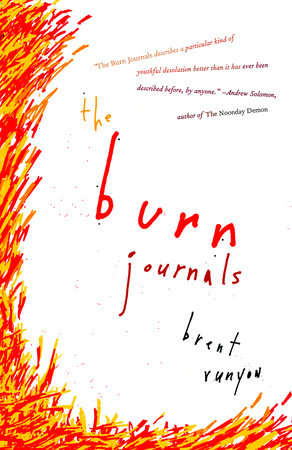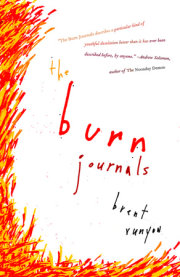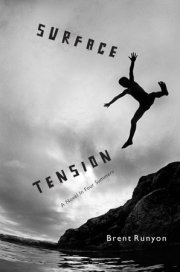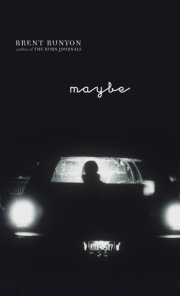When seventh period is finally over, I run to my locker and put all my books inside. I won’t need them anymore. I grab my lock-picking set and a spare Ace of Spades that I have lying around.
At the end of the hallway, I can see Stephen talking to Megan, the girl we both have a crush on. I walk up to them and say hi. She smiles at me and I try to smile back. He looks a little suspicious.
I don’t really want to say anything, I don’t want to tell them what I’m going to do. I hand him the Ace of Spades and say, “Good-bye,” and I walk away. I hope they’ll be happy together.
I see my friend Jake at his locker and give him the lock-picking set. “Use them wisely,” I say, and head toward the bus.
Laura walks with me down D hall. She says, “Hey, I heard you set that fire in gym class.”
“Yeah.”
“What are you going to do?”
“I’m going to set myself on fire.” She stops at her locker, and I keep walking.
On the bus ride home, I sit by myself. I lean my head against the cold glass window and try not to think about all the stupid things I’ve done, all the bad things I’ve done, and all the pain I’ve caused everyone.
My brother is playing basketball outside the house when I get home. He’s shooting free throws.
I rebound the ball for him and throw it back. I don’t want to take any shots. I tell him the whole story, about what I did and what they’re going to do to me. I don’t tell him what I’m going to do to myself.
When I’m done talking, he says, “That sucks,” and I go inside the house. I don’t have to write a note anymore. Craig knows everything.
I walk out to the shed to get the gas can. I bring it inside to the bathroom at the top of the stairs because that’s the room with the most locks. I go back downstairs and get the matches from the kitchen.
I take off all my clothes and put on the pair of red boxers with glow-in-the-dark lips that my mom bought for me at the mall last weekend. I bring my bathrobe into the shower and I pour the gasoline all over it. The gas can is only about a quarter full, but it seems like enough.
I step into the bathtub and I put the bathrobe over my shoulders. It’s wet and heavy, but there’s something kind of comforting about the smell, like going on a long car trip. I hold the box of matches out in front of me in my left hand.
I take out a strike-anywhere match and hold it against the box.
Should I do it?
Yes. Do it.
I strike the match, but it doesn’t light. Try again.
I light the match. Nothing happens. I bring it closer to my wrist and then it goes up, all over me, eating through me everywhere. I can’t breathe. I’m screaming, “Craig! Craig!”
I fall down. I’m going to die. I’m going to find out what death is like. I’m going to know. But nothing’s happening.
This hurts too much. I need to stop it. I need to get up. I stand. I don’t know how I stand, but I do, and I turn on the shower. I’m breathing water and smoke. I unlock the door and open it. My hand is all black. I walk out. There’s Craig with Rusty, our dog, next to him. They have the same expression on their faces.
Craig yells something and runs downstairs. I think he’s calling 911. I’m following him. He hands me the phone and runs off. There’s a woman on the phone asking me questions. I try to tell her what’s happened, but my voice sounds choked and brittle. There’s something wrong with my voice.
The woman on the phone says the fire trucks and ambulances are on their way. Somehow she knows my address. Craig is gone now, gone to get Mom, and Rusty is hiding somewhere. Smoke is coming from the bathroom upstairs and I can see that the whole room has turned black. I look down and see my flesh is charred and flaking and the glow-in-the-dark boxer shorts are burnt into my skin.
The woman on the phone says everything is going to be all right, and I believe her. She has a nice voice. She keeps asking me if I’m still on fire and I say, “I don’t think so.”
I’m walking around the kitchen, waiting for the ambulance to come. I can see my reflection in the microwave. Where’s my hair? Where did my hair go? Is that my face?
We used to put marshmallows in the microwave. We used to watch them get bigger and bigger and then shrink down.
“Oh God, just tell them to get here, just tell them to get here, okay?”
She says, “It’s okay. They’re coming. They’re almost there.”
“I’m so sorry. I’m so sorry.”
“It’s okay, that’s okay.”
I can hear the sirens in the distance now.
I say, “I want to lie down. I’m going to lie down.” It hurts to talk. I think there’s something wrong in my throat.
“You can’t lie down.”
“But I have to.”
“Okay, you can lie down.”
The men are here. The firemen are here. They’re putting me on a plastic sheet. They say I’m going to be okay. One of them puts something over my face. That feels good. That feels so good. The cold air feels so good going into my lungs.
What are they talking about? What are they saying? They’re giving me a shot. They say it’s going to make the pain go away. Make the pain go away.
I’m looking at the faces of all the men who are gathered around me. Their eyes are so blue and so clear.
I turn my head and see Craig in the front hall. He’s yelling and punching the walls. He’s angry.
And my mom is here, and she’s smiling and saying she loves me, and her eyes, which are green like my eyes, are the most beautiful things I’ve ever seen.
Copyright © 2004 by Brent Runyon. All rights reserved. No part of this excerpt may be reproduced or reprinted without permission in writing from the publisher.










